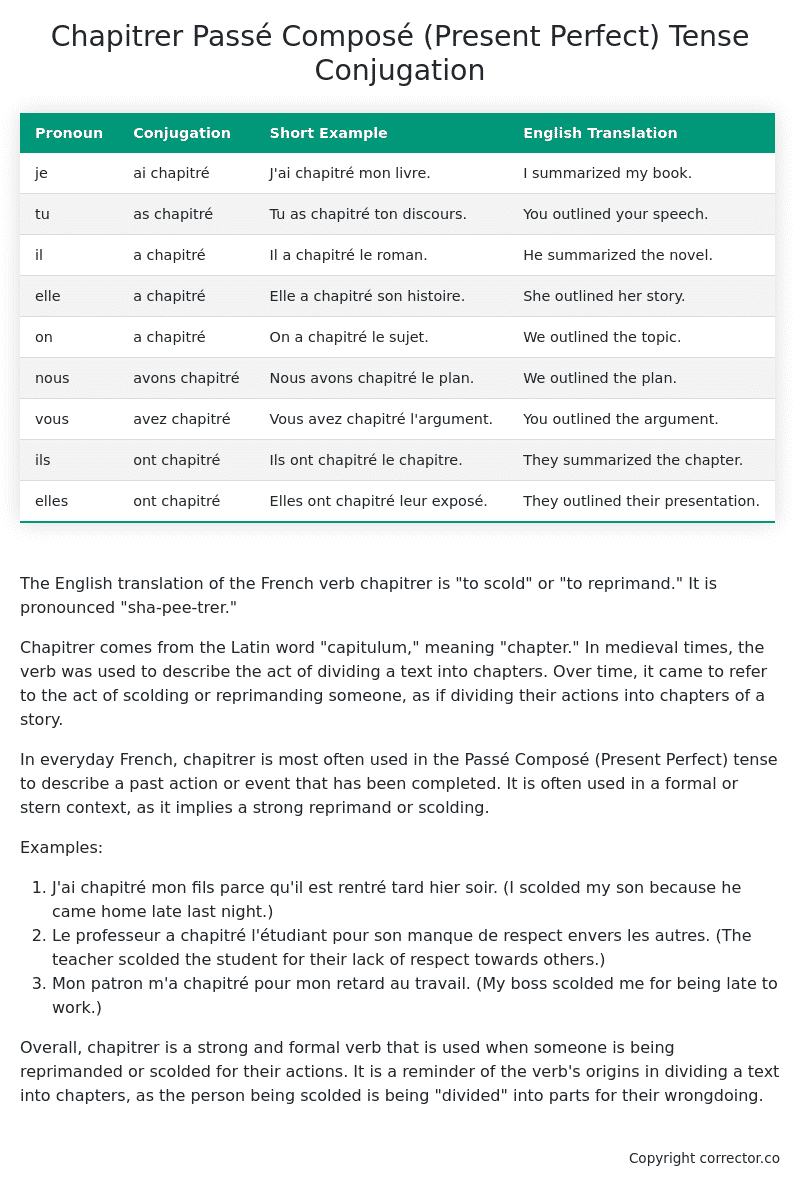Passé Composé (Present Perfect) Tense Conjugation of the French Verb chapitrer
Introduction to the verb chapitrer
The English translation of the French verb chapitrer is “to scold” or “to reprimand.” It is pronounced “sha-pee-trer.”
Chapitrer comes from the Latin word “capitulum,” meaning “chapter.” In medieval times, the verb was used to describe the act of dividing a text into chapters. Over time, it came to refer to the act of scolding or reprimanding someone, as if dividing their actions into chapters of a story.
In everyday French, chapitrer is most often used in the Passé Composé (Present Perfect) tense to describe a past action or event that has been completed. It is often used in a formal or stern context, as it implies a strong reprimand or scolding.
Examples:
- J’ai chapitré mon fils parce qu’il est rentré tard hier soir. (I scolded my son because he came home late last night.)
- Le professeur a chapitré l’étudiant pour son manque de respect envers les autres. (The teacher scolded the student for their lack of respect towards others.)
- Mon patron m’a chapitré pour mon retard au travail. (My boss scolded me for being late to work.)
Overall, chapitrer is a strong and formal verb that is used when someone is being reprimanded or scolded for their actions. It is a reminder of the verb’s origins in dividing a text into chapters, as the person being scolded is being “divided” into parts for their wrongdoing.
Table of the Passé Composé (Present Perfect) Tense Conjugation of chapitrer
| Pronoun | Conjugation | Short Example | English Translation |
|---|---|---|---|
| je | ai chapitré | J’ai chapitré mon livre. | I summarized my book. |
| tu | as chapitré | Tu as chapitré ton discours. | You outlined your speech. |
| il | a chapitré | Il a chapitré le roman. | He summarized the novel. |
| elle | a chapitré | Elle a chapitré son histoire. | She outlined her story. |
| on | a chapitré | On a chapitré le sujet. | We outlined the topic. |
| nous | avons chapitré | Nous avons chapitré le plan. | We outlined the plan. |
| vous | avez chapitré | Vous avez chapitré l’argument. | You outlined the argument. |
| ils | ont chapitré | Ils ont chapitré le chapitre. | They summarized the chapter. |
| elles | ont chapitré | Elles ont chapitré leur exposé. | They outlined their presentation. |
Other Conjugations for Chapitrer.
Le Present (Present Tense) Conjugation of the French Verb chapitrer
Imparfait (Imperfect) Tense Conjugation of the French Verb chapitrer
Passé Simple (Simple Past) Tense Conjugation of the French Verb chapitrer
Passé Composé (Present Perfect) Tense Conjugation of the French Verb chapitrer (this article)
Futur Simple (Simple Future) Tense Conjugation of the French Verb chapitrer
Futur Proche (Near Future) Tense Conjugation of the French Verb chapitrer
Plus-que-parfait (Pluperfect) Tense Conjugation of the French Verb chapitrer
Passé Antérieur (Past Anterior) Tense Conjugation of the French Verb chapitrer
Futur Antérieur (Future Anterior) Tense Conjugation of the French Verb chapitrer
Subjonctif Présent (Subjunctive Present) Tense Conjugation of the French Verb chapitrer
Subjonctif Passé (Subjunctive Past) Tense Conjugation of the French Verb chapitrer
Subjonctif Imparfait (Subjunctive Imperfect) Tense Conjugation of the French Verb chapitrer
Subjonctif Plus-que-parfait (Subjunctive Pluperfect) Tense Conjugation of the French Verb chapitrer
Conditionnel Présent (Conditional Present) Tense Conjugation of the French Verb chapitrer
Conditionnel Passé (Conditional Past) Tense Conjugation of the French Verb chapitrer
L’impératif Présent (Imperative Present) Tense Conjugation of the French Verb chapitrer
L’infinitif Présent (Infinitive Present) Tense Conjugation of the French Verb chapitrer
Struggling with French verbs or the language in general? Why not use our free French Grammar Checker – no registration required!
Get a FREE Download Study Sheet of this Conjugation 🔥
Simply right click the image below, click “save image” and get your free reference for the chapitrer present perfect tense conjugation!

Chapitrer – About the French Passé Composé (Present Perfect) Tense
Formation of the Passé Composé
Set the auxiliary verb with either
Conjugate the auxiliary verb
Add the past participle
Common everyday usage patterns
Narrating Past Events
Sequential Actions
Describing Completed Actions
Interactions with other tenses
Imperfect Tense
Conditional and Future Tenses
Summary
I hope you enjoyed this article on the verb chapitrer. Still in a learning mood? Check out another TOTALLY random French verb conjugation!


